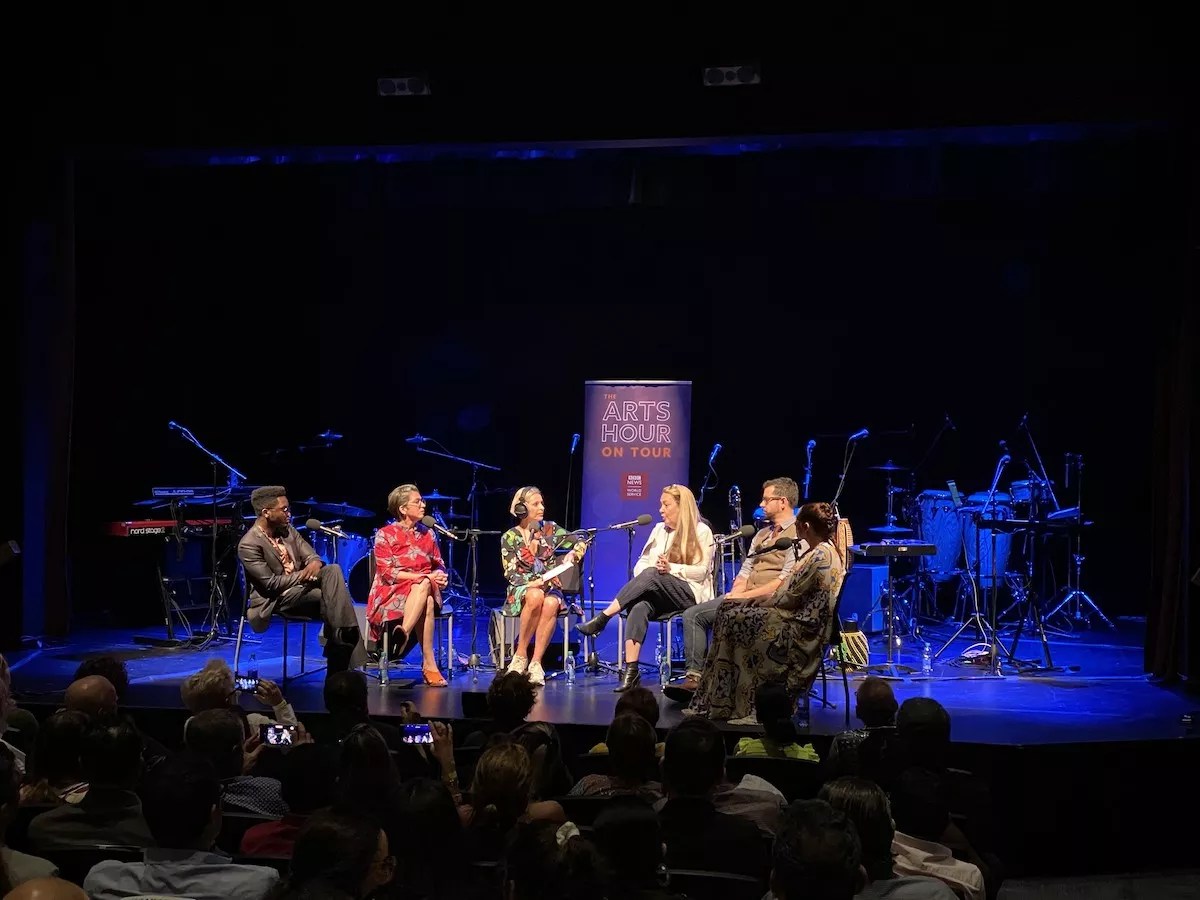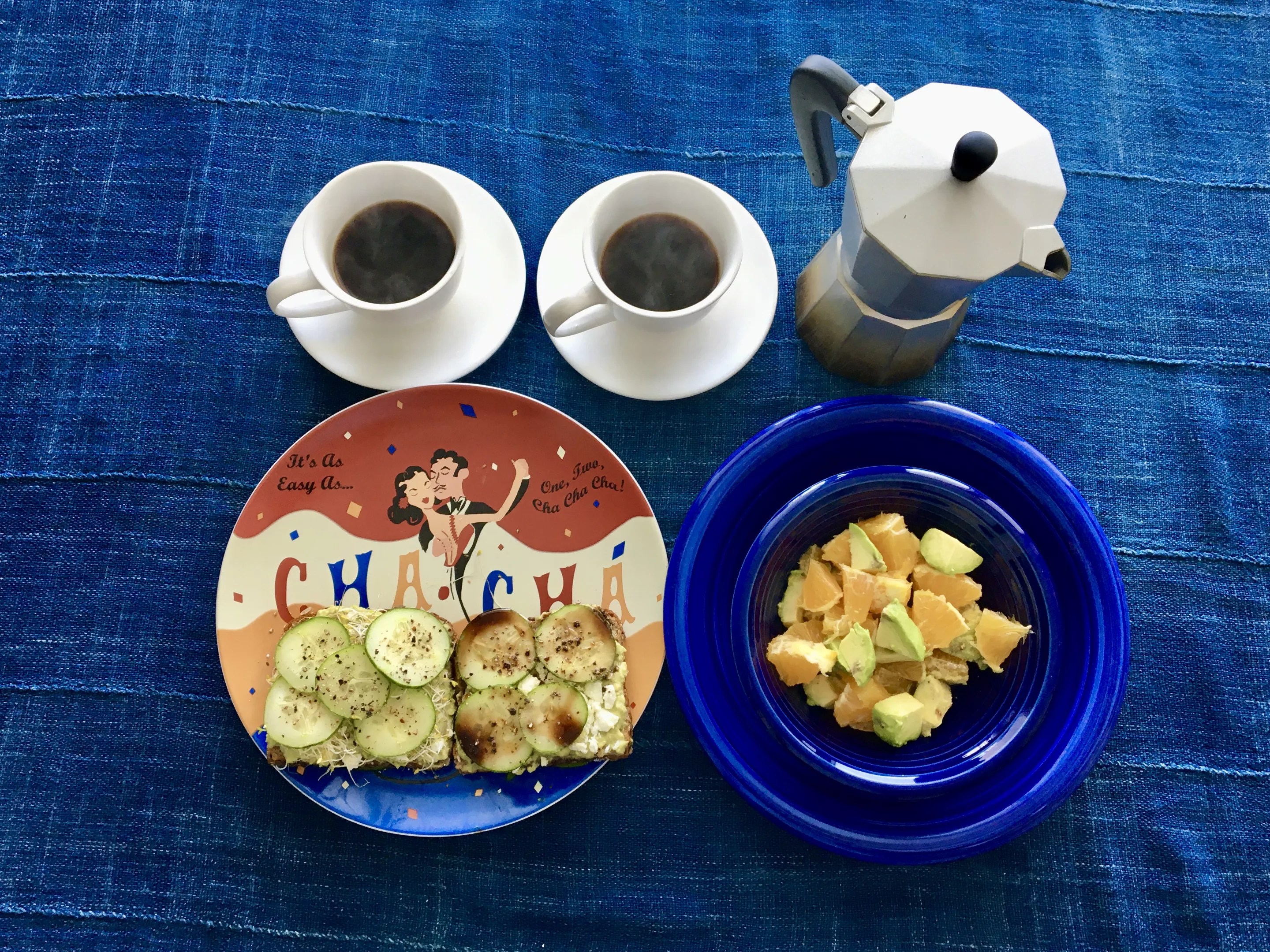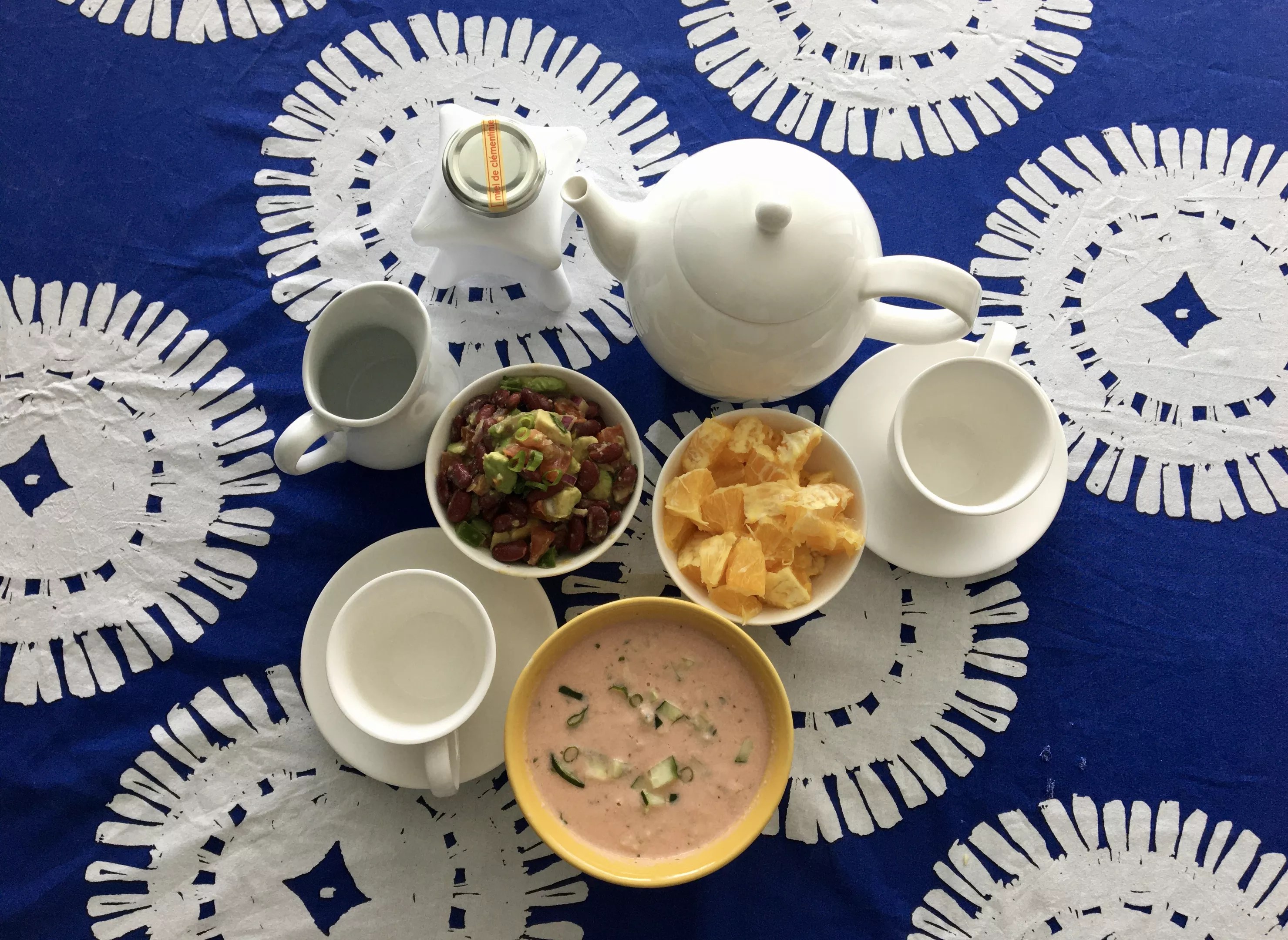
Photo courtesy of BBC Arts Hour

Audio By Carbonatix
We’re all going through it right now: Ask a creative person how they’re doing in today’s hyper-monetized and micro-managed age, and you’re bound to get some variation of “busy,” “stressed,” “pressed for time,” or the always-reliable retort “livin’ the dream.”
As a writer, I lived and worked in Miami as a journalist between 2002 and 2009 before moving back in 2017. While I was here, most of my time with friends was spent at barbecues, cafecitos, or on the beach with little to no handwringing about making arrangements or carving out time to make such meet-ups possible.
When I moved back here, I assumed these customary get-togethers would take place at the same old frequency. That proved not to be the case: In this more populous, faster-paced Miami, socializing seems to require getting dressed up, ride-sharing, and paying for pricey parking, cocktails, and table service. With the rental prices for retail and restaurant space soaring, it’s little wonder we’ve been sold this idea that we need to drop extra money on farm-to-table entrées, artisanal cappuccinos, and venues decked out in mod decor. But with higher costs, longer commutes, side jobs, and social media updates, our lives now vacillate between major going-out productions or long stretches without seeing anyone.
It feels counter to the culture of a peninsula that not only juts into the very sociable region of Latin America and the Caribbean but has for decades served as a narrow-but-welcoming landing strip for people fleeing economic and political strife who are looking to start over through improvisation and cooperation.
Miami socializing, as I knew it, meant Friday night entertainment might start at an Argentinean barbecue sipping Malbec or Cuban mojitos and eating meat off the grill without so much as a paper plate before running out the backyard gate to join a parade of Haitian musicians. You might’ve stopped for coffee at a friend’s house on the way to get groceries, and come back for a potluck after somebody in the parking lot handed you free bags of their mango and avocado surplus. Ambiance could be a string of lights across some plants or on the railing of a deck, and who needed to drive three hours with a tent in tow when you could set up lawn chairs in the driveway and chat with the neighbors?
In these uncertain economic and political times, it seems fitting to revive or maybe even update some of those old customs. Here are a few ways to socialize in Miami without breaking the bank:

Cafecito and Cha, Cha, Cha: orange and avocado salad, open-faced cucumber and avocado toast sandwiches, stove-top expresso, and retro Cuban dance plates.
Photo by Julienne Gage
Host a Cafecito
Don’t get me wrong, I like an artisanal brew as much as the next Wynwood arts fan, but you can buy a bag of Bustelo and a small stove-top percolator for less than the cost of two double-shot espressos. For my next cafecito party, I’ve pulled out some old Cuba-inspired dance plates (Rumba, Mambo, and Cha-Cha-Cha) some espresso cups, and I’m hosting a listening session of the BBC Arts Hour’s Miami episode. Recorded before a live studio audience in Little Havana this January, the show features a politically diverse cross-section of Cuban artists – locals and ones on visit from Havana – engaging an equally diverse and opinionated audience of mostly Miami Cubans on what being Cuban means to them.
In between a very thoughtful discussion in which nobody calls anyone a commie or a gusano, but everyone expresses their hopes and feelings, Havana’s latest sensation Cimafunk and Miami’s own Leslie Cartaya take turns sharing their renditions of Cuban music.
“Despite the magnitude of the event and what it meant that the BBC would bring it to 90 million listeners, it felt as though we were sharing a colada(shots of Cuban espresso) among friends debating the news of the day,” says my friend and neighbor Yamilet Hernandez, a Cuban émigré who helped produce the event. “It felt as though we could use this intimate space to finally talk and let go of the pain – to debate, to disagree, to air our old issues – in a non-confrontational way.”
Whether you’re pulling out Miami-themed programming or simply getting together to binge-watch your favorite show, offering coffee and compelling content from the comfort of your own home is as time-honored a tradition as they come.

Laundered and pressed, vintage shower curtains make for excellent tea time table cloths.
Photo by Julienne Gage
Take Some Tea Time
Growing in the Pacific Northwest, my mom used to pull out a kid-sized table cloth with cute embroidery, tiny china cups, and a little pitcher, then mix English Breakfast and dairy in what she called “milk tea.” As I got older and started traveling, I found that like coffee, tea has an almost universal way of making people feel cozy. Here in the tropics, lemon, hibiscus, or mint teas feel refreshing even on hot days.
Last fall, my pal Gnima Diop, a Senegalese economist, came to visit from Dakar to talk about economic and cultural engagement between this region and hers. Perplexed that most Floridians say you can’t do much with Africa the continent in the so-called Capital of Latin America, we created a “Things Come Together” dinner and invited anyone we suspected might share our vision.
As the peanut stew simmered on the stove, Gnima served up hot cups of red sorrel tea. Made from the leaves of dried hibiscus, she told us she’s used to warm the palates and hearts of foreigners who’ve just arrived to her country for cultural exchanges.
“It’s a symbol of unity, family, and celebration,” she said, explaining that it is served during special occasions such as holidays, baptisms, weddings and naming ceremonies.
Our guests – many of them Caribbean – grinned. Most found it quite familiar because in this hemisphere, sorrel tea is popularly spiked with rum and spice at Caribbean holiday parties, and it’s used for toasting at Juneenth celebrations.
Tempt ‘Em With Tapas
Now for the food. These days, people seem to hardly have the living space or free time for barbecues but it takes but a minute to slice up some Florida oranges, mangoes, and avocadoes – as simple dishes or in some kind of funky chutney, salsa, or salad. You can also put them in smoothies or blend them into any number of cold gazpachos – traditional tomato or cucumber and melon. With farmer’s markets located everywhere from Coconut Grove to Normandy Isle, and Biscayne’s Upper Eastside, why would you bother to put your name on a brunch list?
Once again, the presentation is half the fun. Why not dig through your cupboards or go through the thrift stores collecting art-deco style fiesta wear? The more mismatched, the merrier. And if nostalgia is what you’re aiming for, my friend John Maass, a longtime South Florida filmmaker, says cucumber sandwiches can really take you back a few years.
“I remember hearing they were popular with the socialites in Palm Beach during the 1950s,” says Maass, who’s been poking around for details about South Florida in that era.
In fact, you can get a taste of that world by joining the almost 229,900 listeners the Podbean Dashboard shows have downloaded Chillingworth, a true-crime podcast Maass and his childhood pal Jonathan Paine produced about a murder mystery in their native West Palm Beach.
In 2012, the two started collecting material for what will ultimately be a podcast and documentary film project. Relying on detectives’ surveillance recordings, old footage, and testimonials from older Palm Beach residents, they reconstruct the grisly murder of Palm Beach County Circuit Judge Curtis E. Chillingworth and his wife, Marjorie, who were dragged from their beach house, put on a motorboat, and then tied up, weighted down, and tossed overboard into the Atlantic Ocean in 1955.
A quiet crusader of civil rights, Chillingworth ruled on the side of women and people of color more often than his colleagues, and wasn’t afraid to call out the corruption of his peers. But to get the full story, you should probably plan a whole series of tapas parties. For now, I can tell you the podcast gives new meaning to that old Florida motto “Sunny place, shady people,” so don’t be surprised if you jump at the sound of your own fork hitting the plate.
If You Explain It, They Will Come
A few months ago, when I first started telling my friends I wanted to revive these small, cheap activities, or introduce ones I learned in other highly social societies, I got pushback. Not only were they usually too busy for a DC-style happy hour, they’d do something even more DC by suggesting we map some events at a much later date on the calendar. If I complained, they’d remind me I’m the one who’s often working out of town.
So lately I just start listing off some quirky ideas. I’ll ask them if they’ve ever had an avocado and orange salad with honey from Homestead, tell them I’ve got to explore a new Miami-based podcast or album and wouldn’t they like to drop by for a listening session while taking some tea on my shower curtain?
Sometimes they just giggle and say “Loca, I’ll call you later,” but lately they’re becoming more receptive, and sometimes they even come back at me with their own innovative plan. About an hour before one of this winter’s Democratic debates and the night before I had another big flight, Yamilet, came by to get my house key so that she could water my plants.
“What’s in your fridge? What needs to be eaten?” She asked as she walked in the front door, made a beeline for the refrigerator, and started pulling vegetables out of its crisper drawers. “Hand me that box of couscous. Somebody just gave me one of those ceramic tagines from Morocco. Now go pack, I’ll be back and we can watch the debates.”
Forty-five minutes later, she re-appeared with a meal so decadent I felt as though I’d been transported to the Sahara, and considering the current state of modern American, I kind of wished it were true.
Yamilet likes to remind me that this is just how Cubans do things, that it’s really not so novel, and, having lived in Cuba, I get the pragmatics. But it’s also a kind of magic Cubans and other cultures bring to Miami and sometimes shed over time.
My longtime pal Marisa Heckstall, an Argentinean speech therapist emigrated here in the late 1990s and co-founded Speech Time, a company that helps diverse, multilingual families and children identify and treat wide array of speech and developmental challenges. She and a whole host people from South America and the Mediterranean took up the cheap housing on South Beach which came open as the area’s elder population passed on. Cafecitos, barbecues, beach time, backyard art parties were a way of life for her clan of Gen-Xers.
“It felt very bohemian, and that was appealing. Many of us had been born into or grown up in dictatorships or wars. We were from different places, but we felt this shared sense of freedom – to be young, passionate, creative, and hopeful,” says Heckstall. “Then came the new millennium, 9/11, the total collapse of the Argentinean economy – it was so heavy. We were far from home, far from our relatives, so there was something about that sense of family. We were Miami.”
Marisa grew her business, sometimes taking the kids of her old South Beach friends as clients while raising her son as a single mother. As the years went on and people moved further out of the area for cheap housing, it got harder and harder just to get her to the corner for an espresso. Now, with her son finally off at college, she’s more available, but don’t push it. She wants healthy food, a reasonable commute, and she’s got to be home for a decent bedtime.
“Fine,” I told her the other day. “Help me make a salad and we’ll sip some sangria in these red ceramic goblets I picked up at Dragonfly Thrift Store for $3 each.”
As impossible as it may seem, there is still room in Miami to make time for what’s really important – culture, friends, and the moments where the two beautifully intersect – without draining your savings.